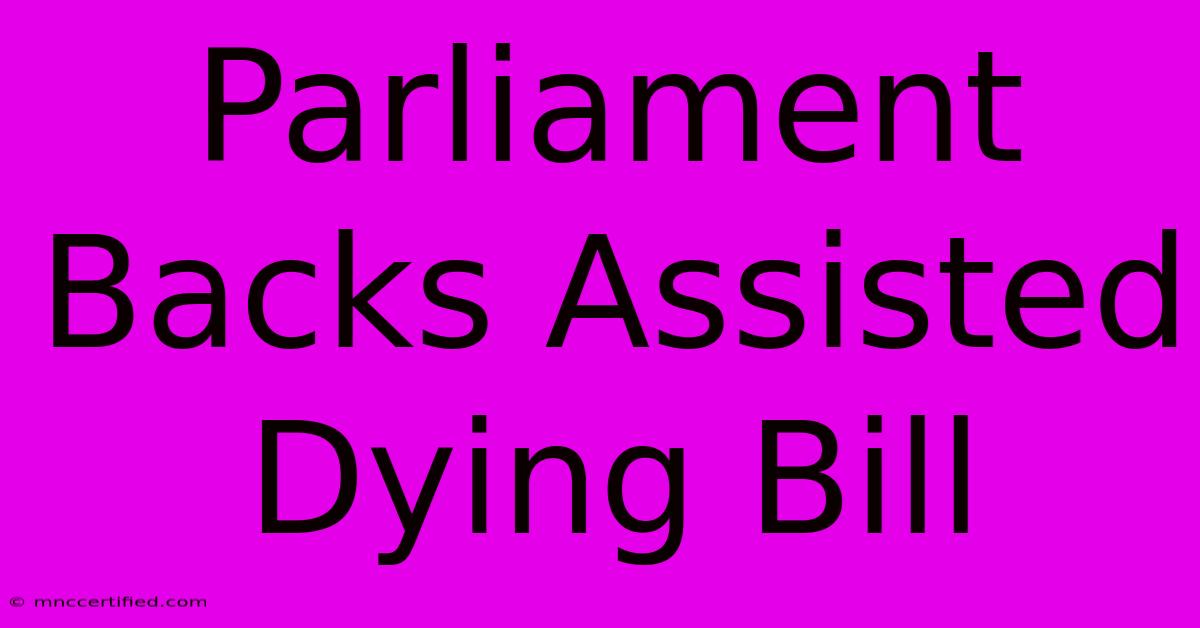Parliament Backs Assisted Dying Bill

Table of Contents
Parliament Backs Assisted Dying Bill: A Landmark Moment for End-of-Life Care
The recent parliamentary backing of the Assisted Dying Bill marks a significant turning point in the debate surrounding end-of-life care. This landmark decision, while celebrated by many, also raises complex ethical and practical considerations that warrant careful examination. This article will delve into the details of the bill, exploring the arguments for and against its passage, and analyzing its potential implications for the future of healthcare.
Understanding the Assisted Dying Bill
The core of the Assisted Dying Bill centers on providing terminally ill adults with the legal right to choose assisted suicide under strict and carefully defined circumstances. These safeguards are crucial to preventing abuse and ensuring that only those who meet specific criteria can access assisted dying. Key provisions typically include:
- Terminal illness diagnosis: Individuals must have a terminal illness with a prognosis of less than six months to live. This condition ensures that only those facing imminent death can access the option.
- Capacity and voluntariness: The individual must possess the mental capacity to make informed decisions and request assisted dying voluntarily, without coercion.
- Multiple medical opinions: The bill usually requires confirmation of the diagnosis and prognosis from at least two independent physicians. This measure adds an extra layer of protection against errors or undue influence.
- Strict procedural safeguards: The process for accessing assisted dying is designed to be rigorous, with multiple checks and balances to ensure compliance with the law and protect vulnerable individuals. This may involve counseling, waiting periods, and regular review by medical professionals.
Arguments in Favor of the Bill
Supporters of the Assisted Dying Bill argue that it respects individual autonomy and the right to self-determination. They highlight the importance of allowing competent adults to make choices about their own death, particularly when facing unbearable suffering. Key arguments include:
- Compassion and dignity: The bill offers a compassionate option for individuals suffering from debilitating and incurable illnesses, allowing them to die with dignity and control over their final moments.
- Relief from unbearable suffering: For some individuals, the pain and suffering associated with terminal illness can be intractable, making assisted dying a preferable alternative to prolonged and agonizing decline.
- Respect for individual autonomy: The bill upholds the fundamental principle of self-determination, recognizing the right of individuals to make informed decisions about their own lives and deaths.
Arguments Against the Bill
Opponents of the bill raise significant ethical and practical concerns, focusing on potential risks and unintended consequences. Their arguments often center on:
- Slippery slope concerns: Critics fear that legalizing assisted dying could lead to a "slippery slope," expanding eligibility criteria and potentially endangering vulnerable populations.
- Potential for coercion and abuse: Concerns exist that individuals might be pressured into choosing assisted dying, especially those feeling isolated, dependent, or facing financial difficulties.
- Impact on palliative care: Some worry that legalizing assisted dying could divert resources away from palliative care, potentially undermining efforts to provide comprehensive pain management and supportive care for the terminally ill.
- Religious and ethical objections: Many oppose assisted dying based on religious or moral beliefs that consider the taking of a human life, even with consent, to be morally wrong.
The Road Ahead: Implementing the Bill Effectively
The successful passage of the Assisted Dying Bill presents both opportunities and challenges. Effective implementation requires careful attention to detail, including:
- Robust oversight and monitoring: A system of independent monitoring and review is essential to ensure compliance with the law and identify any potential problems.
- Comprehensive education and training: Healthcare professionals need appropriate training to understand the bill's provisions and apply them ethically and responsibly.
- Addressing concerns about access and equity: Steps must be taken to ensure that access to assisted dying is equitable and doesn't disproportionately affect vulnerable populations.
- Continued public dialogue and engagement: Ongoing public discussion and engagement are essential to address emerging issues and adapt the legal framework as needed.
Conclusion: A Complex Issue Requiring Ongoing Debate
The parliamentary backing of the Assisted Dying Bill represents a significant shift in the landscape of end-of-life care. While proponents celebrate the bill as a victory for individual autonomy and compassion, opponents remain concerned about potential risks and unintended consequences. The successful implementation of this legislation will require careful planning, robust oversight, and ongoing public dialogue to ensure that it achieves its intended goals while safeguarding vulnerable individuals and upholding ethical principles. This landmark decision will undoubtedly continue to spark debate and shape the future of end-of-life care for years to come. The ongoing conversation surrounding this complex issue highlights the need for open discussion and a thoughtful approach to ensure that the rights and dignity of all individuals are respected.

Thank you for visiting our website wich cover about Parliament Backs Assisted Dying Bill. We hope the information provided has been useful to you. Feel free to contact us if you have any questions or need further assistance. See you next time and dont miss to bookmark.
Featured Posts
-
Live 2024 Black Friday Deal Updates
Nov 30, 2024
-
Colorado Oklahoma State Hunters Impact
Nov 30, 2024
-
Barry Bonds Authentic Jersey
Nov 30, 2024
-
Match Preview Sheffield Utd Sunderland
Nov 30, 2024
-
Black Friday Final Day Deals
Nov 30, 2024